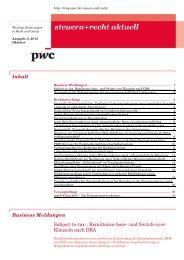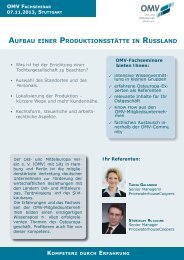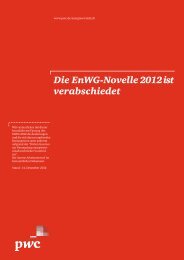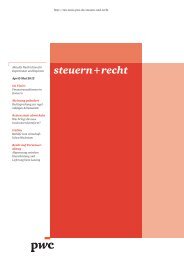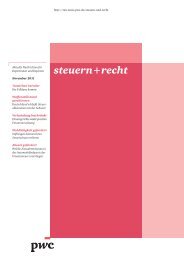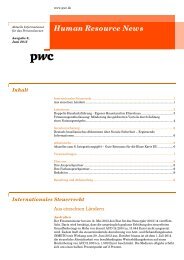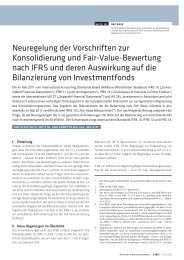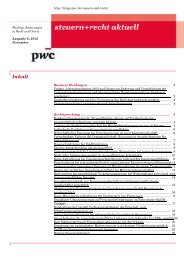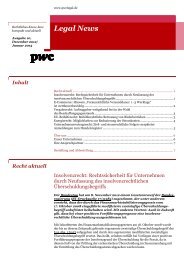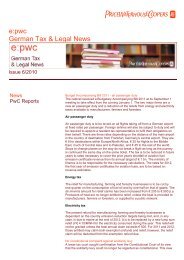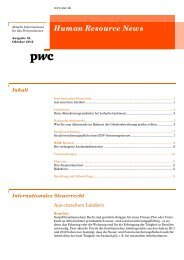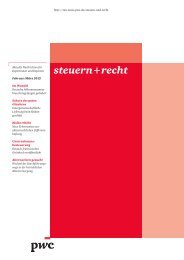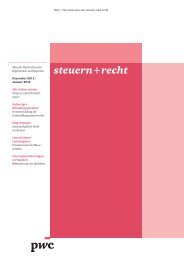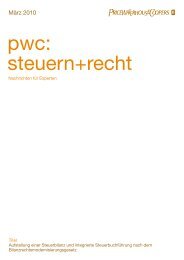Download legal-news-issue-7-2011 - PwC Blogs
Download legal-news-issue-7-2011 - PwC Blogs
Download legal-news-issue-7-2011 - PwC Blogs
You also want an ePaper? Increase the reach of your titles
YUMPU automatically turns print PDFs into web optimized ePapers that Google loves.
From Europe<br />
Tax & Legal News October 13, <strong>2011</strong> 12<br />
Supreme Tax Court judgment V R 44/09 of April 7, <strong>2011</strong> published on August 31<br />
No requirement to exempt foreign service allowances for work in country of<br />
residence on same terms as those paid abroad<br />
A German resident French national taught in a local Franco-German school. She had civil<br />
service status and was paid from the French public purse. Her emoluments were taxable<br />
in France under the double tax treaty, but were taken into account when setting the rate<br />
to be applied to her other, taxable income in Germany. They consisted of scale rate pay<br />
and two foreign service allowances. The pay was taxable under French law, but the<br />
allowances were exempt. She claimed that they should also be fully exempt in Germany,<br />
that is they should left out of account when setting her other income rate. She based her<br />
claim on the free movement of workers requirement for equal treatment in the light of the<br />
full exemption in German law of corresponding payments to government servants abroad,<br />
but taxable in Germany under the relevant double tax treaty.<br />
The ECJ has now held that there has been no discrimination, despite initial appearances.<br />
As a German resident French citizen, she has not been treated any worse than a German<br />
resident German citizen. That a German civil servant resident in another EU member<br />
state enjoyed complete German exemption on his foreign service allowances was not a<br />
relevant comparison as it ignored the secondary effects in the foreign state, in this case,<br />
the effect on the tax charge on the other, locally taxable income.<br />
The ECJ case reference is C-240/10 Schulz-Delzers judgment of September 15, <strong>2011</strong>.<br />
SWIFT services subject to VAT<br />
A Finnish bank claimed a refund of the VAT it had paid by reverse charge on its SWIFT<br />
costs in connection with processing national and international transfers of cash and<br />
securities. Its basis was that SWIFT effected a transfer service; thus its charges were<br />
exempt under the Sixth Directive as remittance business or securities dealing as the case<br />
might be. As against this, the tax authorities maintained the services were taxable as<br />
technical support, as they did not effect the actual transfer of funds or instruments.<br />
The ECJ has now held the SWIFT charges for its services to banks to be taxable. SWIFT<br />
bears responsibility to its banking members for the correct transmission of messages, but<br />
has no access to their content. It bears no responsibility for the correct execution of the<br />
instructions it transmits. It does not therefore effect the actual transfer, but merely passes<br />
the necessary information for the transfer to be effected by the receiving bank. This<br />
applies to dealings in both cash and securities. The service is thus a support service for<br />
banks, rather than an outsourcing of banking business.<br />
The ECJ case reference is C-350/10 Nordea judgment of July 28, <strong>2011</strong>.<br />
Personal residence not immediately relevant to VAT place of business<br />
A German trader hiring drivers to haulage companies moved his business to Austria, but<br />
continued to service his German customer base. He also moved his main personal<br />
residence to Austria, but retained accommodation in Germany. On re-registering his<br />
business in Austria, he started billing his German customers free of VAT but with a note<br />
on the invoice to the effect that the customer should account for the VAT as a reverse<br />
charge. The German tax office challenged this position, saying that the trader continued<br />
to live in Germany. His business therefore continued to be established in Germany. As a<br />
domestic business providing a service to a domestic customer, his invoices were not open<br />
to reverse charge. Rather he should have charged the VAT and accounted for the amount<br />
to the tax office.<br />
The ECJ has now held that the business establishment is the relevant criterion for<br />
determining a VAT filing obligation. A personal residence of the proprietor is of no<br />
moment, unless there is doubt as to where the business was located. Even then, its<br />
significance was that of an indicator as to where the business might be, rather than as part<br />
of the definition of a domestic/foreign business. Since there was no doubt in this<br />
particular case that the business had genuinely been established in Austria, there was no



